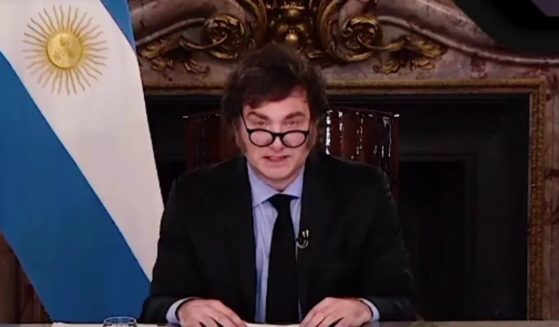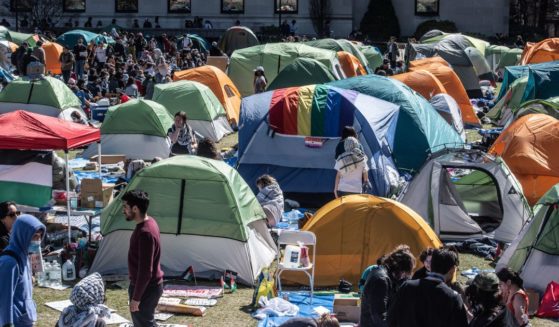The Supreme Court's Decision Leaves Religious Freedom Claims in Murky Waters
At the U.S. Supreme Court on Monday, Justice Anthony Kennedy delivered a long-awaited opinion concerning Jack Phillips, the Christian baker who owns Masterpiece Cakeshop located in Lakewood, Colorado, west of Denver. Kennedy and the court ruled in favor of Phillips, 7-2.
In July 2012, Phillips, who had provided cakes and other confections for 22 years, refused to bake a wedding cake for two gay men. In keeping with his religious convictions that marriage should be between a man and a woman, he maintained that he could not lend his artistic ability to the designing of a cake used to celebrate a same-sex union.
The two men filed a legal charge against Phillips under the Colorado Anti-Discrimination Act claiming discrimination against them because of their sexual orientation. The case proceeded before the Colorado Civil Rights Commission, the Colorado Court of Appeals, and finally to the U.S. Supreme Court.
The outcome of the decision in favor of Phillips can certainly be described as a victory for him. The court stated that the Colorado Commission’s order must be set aside. The now-invalidated order had required Phillips to (1) refrain from baking any wedding cakes unless they were made for both same-sex and opposite-sex couples, (2) retrain his employees to accept cake orders from gay couples, and (3) make annual reports to the commission for two years. This was an officious and needlessly intrusive order that the high court nixed.
However, the fundamental issue of whether the constitutional right of the free exercise of religion must yield to the recently devised use of state policing powers to favor gay claims for equal treatment remains unresolved by this decision. Justice Kennedy explicitly referred to “later cases raising these or similar concerns.” He said that “the outcome of cases like this in other circumstance must await further elaboration in the courts.”
Therefore, the central question about the interplay of constitutional rights of speech and free exercise of religion on the one hand, and “gay rights” on the other hand, remains uncertain.
That being the situation, how does the Supreme Court conclude that Phillips wins and Colorado loses in this case? The court found that the conduct of the Colorado Civil Rights Commission was “inconsistent with the State’s obligation of religious neutrality.”
First, the court noted that on at least three occasions the commission exonerated bakers from charges of discrimination under CADA; these were bakers who turned down patrons who wanted religious messages on cakes that opposed gay marriages. In short, according to the commission, if you refused to celebrate a gay union by refusing to bake a cake, you discriminated. However, if you refused to bake a cake containing a religious message opposing gay unions, you were not discriminating.
Secondly, the court focused on the intolerant statements by various Colorado Civil Rights commissioners made at the public hearings on Phillips’ case. The commissioners endorsed “the view that religious beliefs cannot legitimately be carried into the public sphere or commercial domain, implying that religious beliefs and persons are less than fully welcome in Colorado’s business community.”
Moreover, another commissioner called Phillips’ beliefs “despicable pieces of rhetoric” allowing people to use “their religion to hurt others.” This commissioner, the court complained, “even went so far as to compare Phillips’ invocation of his sincerely held religious beliefs to the defense of slavery and the Holocaust.”
The majority opinion said that it could not avoid concluding that “the fairness and impartiality of the Commission’s adjudication of Phillip’s case” was in doubt. Even most of the court’s liberal wing had no trouble agreeing to that. As Kennedy said along with the other six justices who joined or concurred in the opinion, “the Commission’s treatment of Phillips’ case violated the State’s duty under the First Amendment not to base laws or regulations on hostility to a religion or religious viewpoint.”
And yet, as pointed out above, there is reason to question the full extent of exactly what this opinion means. Does it mean that if the Colorado commissioners had been more restrained in their public statements and more circumspect about how they conducted themselves during public hearings that a majority of justices might have viewed a decision against Phillips as defensible?
And, what about the right of free speech which Phillips raised by pointing out that by being forced to bake a cake in these circumstances he was being compelled to speak a message provided by the government or another person with which he strongly disagreed? The “compelled speech doctrine” (W. Va. State Board of Education v. Barnett), which remains frequently cited after 75 years of use, was essentially ignored by the court in the majority opinion.
One can rejoice that baker Phillips is finally allowed to return to his cake-making for opposite-sex couples planning weddings. However, for those other providers of goods and services — photographers and florists, for example — who observe religious limits on how or whom they can serve, this decision leaves them in the murky waters of uncertainty.
Dr. John A. Sparks is the retired dean of Arts & Letters at Grove City College and a fellow for The Center for Vision & Values. He is a graduate of the University of Michigan Law School and a member of the State Bar of Pennsylvania. He is a frequent contributor of articles based upon U.S. Supreme Court developments.
A version of this Op-Ed previously appeared on The Center for Vision & Values website.
The views expressed in this opinion article are those of their author and are not necessarily either shared or endorsed by the owners of this website. If you are interested in contributing an Op-Ed to The Western Journal, you can learn about our submission guidelines and process here.
Truth and Accuracy
We are committed to truth and accuracy in all of our journalism. Read our editorial standards.











